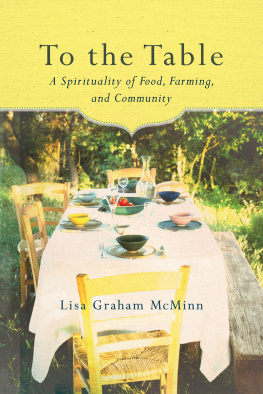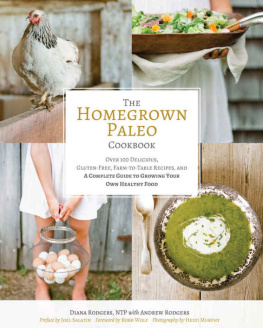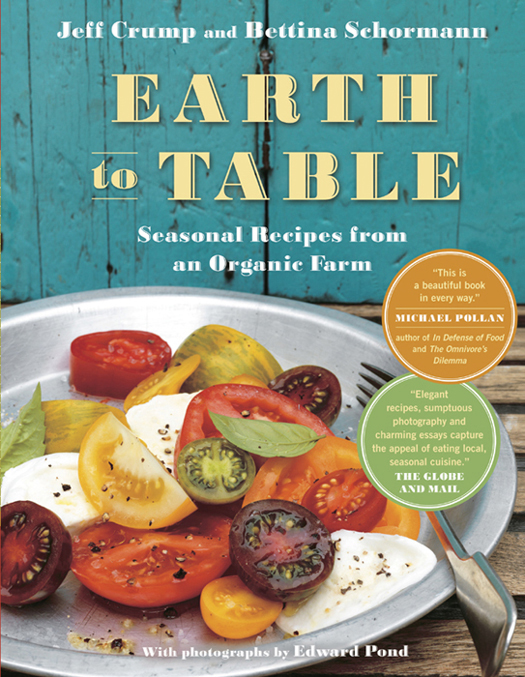Praise for
Earth to Table
You will not find a clearer or more compelling expression of the values of slow food than Earth to Tables four-season testament to the importancenot to mention delightof food that has been grown with care and cooked with conviction.
Michael Pollan, author of In Defense of Food and The Omnivores Dilemma
From the first pages of this gorgeous book, where, instead of a dish of carrots, you see carrots coming out of the earth, you know that Jeff Crump and Bettina Schormann have taken earth-to-table cooking to a new level.
Deborah Madison, author of Local Flavors:
Cooking and Eating from Americas Farmers Markets
Even if this book is penned by two chefs, the recipes are well-suited to family meals and feasts. There is plenty here for the amateur cook, and experienced foodies will appreciate the purity and simplicity of letting the ingredients do the talking.
Ottawa Citizen (CanWest news service)
This cookbook will resonate with the do-no-harm category of cooks. Its an inspiration for those who want to eat seasonally, locally and organically.
Vancouver Sun
Ive always believed the mark of a good cookbook is how banged up and stained the pages become, and if I judged Earth to Table by this metric after my week of testing it, youd assume good food must live here. Coincidentally, it does.
Porsha Perreault, Taste T.O.
Their enthusiasm is infectious, as they write odes to the seasons, and to the pleasures of foraging and preserving: You may find yourself with an inexplicable urge to pickle some beets or buy the last summers peaches for Bettinas Whisky Peaches and Cream.
Sasha Chapman, The Globe and Mail
PUBLISHED BY RANDOM HOUSE CANADA
Text copyright 2009 Jeff Crump
Photographs copyright 2009 Edward Pond, except where noted in the photography credits below
All rights reserved under International and Pan-American Copyright Conventions. No part of this book may be reproduced in any form or by any electronic or mechanical means, including information storage and retrieval systems, without permission in writing from the publisher, except by a reviewer, who may quote brief passages in a review. Published in 2012 by Random House Canada, a division of Random House of Canada Limited, Toronto. Distributed in Canada by Random House of Canada Limited.
www.randomhouse.ca
Random House Canada and colophon are registered trademarks.
Library and Archives Canada Cataloguing in Publication
Crump, Jeff
Earth to table : seasonal recipes from an organic farm / Jeff Crump and Bettina Schormann; with photographs by Edward Pond.
Includes index.
eISBN: 978-0-307-36280-3
1. Cooking, Canadian. 2. CookingOntario. 3. Cooking (Natural foods). 4. Ancaster Old Mill Restaurant. I. Schormann, Bettina II. Title.
TX945.5.A56c78 2012 641.509713 C2008-904129-1
Photography credits copyright:
: Liliane Calfee Miller
Any errors or omissions, please contact the publisher.
Food Styling and Props: Claire Stubbs
Recipe Editor: Kate Dowhan
Recipe Tester: Mike Vogt
Cover design by Kelly Hill
Cover image: Edward Pond
v3.1
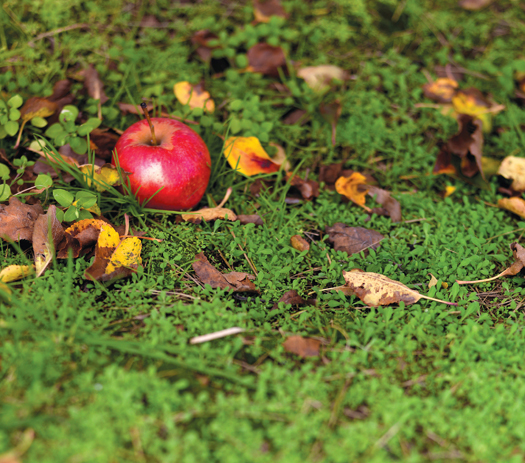
For Jules, Maus, Layla & Lawrence with love and Gunner, always in my heartJ.C.

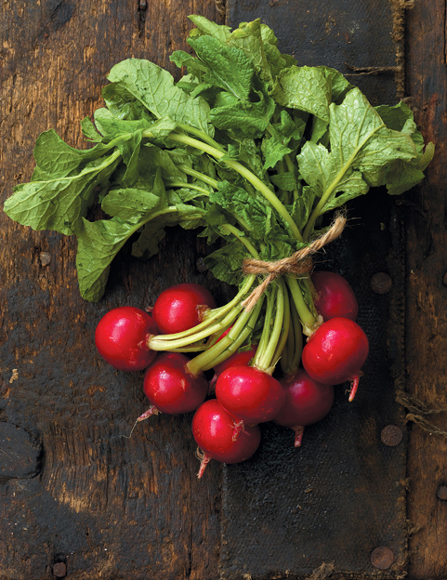
Eating is an agricultural act.
WENDELL BERRY
CONTENTS
Introduction
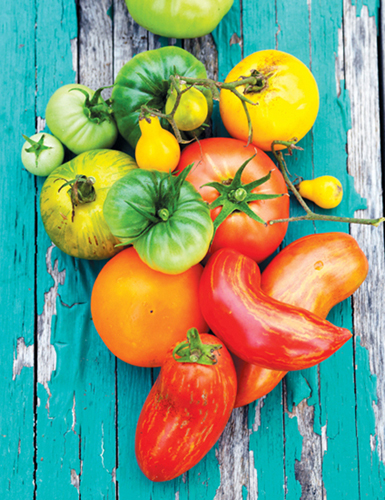
Everybody has some sense of what good food is.
What many of us actually eat may not taste especially good, may not be particularly good for us, and probably comes from a farm or factory we dont want to even imagine. But thats not because we dont know what we want. Its just that we always seem to end up eating something else.
After all, marketers know what we want. There is hardly an industrial-grade fast-food burger that is not advertised with images of dewy, plump tomatoes, wholesome bread straight from the oven, some kind of premium beef. The reality of flaccid vegetable matter, a soggy bun and tasteless meat is, of course, rather different. But thats not really newsjokes about fast food that doesnt look anything like the commercials arent even funny anymore. What is significant is that we are so mesmerized by the promise of fresh, wholesome food that we can be tricked into eating something else. Packages wouldnt be decorated with images of traditional farms and contented animals, and commercials wouldnt depict chefs and Italian grandmothers carefully tasting this or that authentic recipe, if these werent the things we all think of as important.
The desire for food grown and prepared with care is not elitist or limited to a band of hippies. Its what we all want.
Similarly, just as no one says they want tasteless, truck-ripened vegetables or feed-lot beef, no one deliberately plans a rushed meal. And yet, again, that is what we end up eating, wolfing down burgers in our cars or slurping a plastic tray of microwaved pasta as we stand hunched over the kitchen sink. Fast-food companies rarely show lonely people eating in their cubicles at work, or solitary figures heedlessly munching as they watch television at night. As usual, the marketers seem to know what we really want: they show smiling families gathered around the dining-room table. Talking, laughing, spending time together. If marketers know what we want, why dont we get what we want?
In other words, were promised one thing, and we get something else. We end up gulping down food of dubious provenance when what we really want is to linger with friends and family over a meal of fresh, wholesome ingredients, carefully prepared. Fast food is sold to us on the merit of its illusory resemblance to Slow Food.
In any case, there is no point complaining about the food we dont want to eat. No point being negative or wringing our hands about what other people eat. Besides, I am not invulnerable to the seductions of certain burgers. So Im not here to wag my finger at anybody. I just wanted to make the point that I probably dont have to convince anyone that fresh, wholesome, carefully prepared food, enjoyed in a civilized manner with people we care about, is the way to goits what everyone already wants. In fact, paying attention to what we want is a good way to figure out whats right to eat: tomato salad in August, fish and chips by the sea, a cold beer with lime on a hot summer day, even chicken wings with friends while watching football. Strawberries in February? Beef stew in July? Forget it.
Of course, paying attention to our hankerings wont tell us everything we need to know, partly because industrial-scale farming, shopping and eating have permitted our culture to forget a great deal that we once knew about food, and its hard to have a craving for something youve never thought of or even really noticed. If youre accustomed to eating fast-food french fries, youd never know that even fries are seasonal (potatoes are not at their best between January and March). And if youre used to nuking your dinner in a microwave, you might not have developed a longing for the experience of a kitchen filled with the aromas of cooking, the warmth of the stove, the steamy clatter of pots or the satisfaction of washing up. There are some things we have to remember






